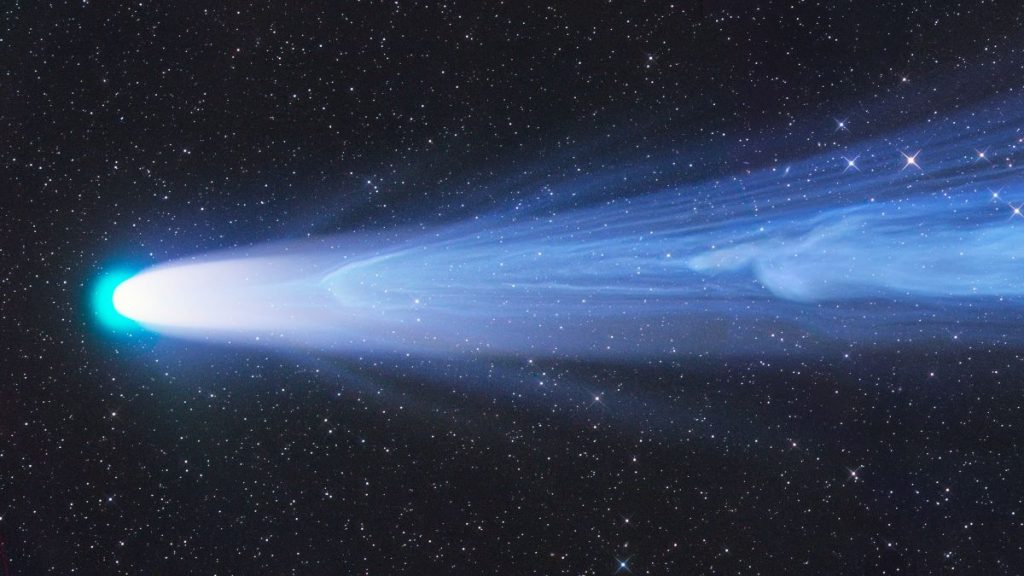
Stunning image of Comet Leonard breakup wins top astronomy photography prize of 2022 (Image Credit: Space.com)

A flare in last year’s brightest comet topped entries in an astronomy photographer contest.
Gas spewing off the tail of Comet Leonard won the top prize of the Royal Observatory Greenwich’s Astronomy Photographer of the Year contest for 2022. Comet Leonard broke into pieces early this year after rounding the sun, but not before producing a long tail easily visible in amateur photos.
The winner, Gerald Rhemann, will be featured among the top category entrants at the National Maritime Museum (opens in new tab) in Greenwich, U.K. in an exhibit opening Saturday (Sept. 17).
In pictures: Amazing photos of Comet Leonard in the night sky
“Rhemann’s astonishing image of Comet Leonard, a long-period comet first identified in January 2021, was captured by the Austrian photographer in Namibia on Christmas Day,” the observatory stated, adding the decision to award Rhemann the top prize was unanimous.
“This award is one of the highlights of my astrophotography work. All the effort that went into making this image a success was worth it,” added Rhemann in the same statement.
The contest received more than 3,000 entries from 67 countries and you can see the top selectees in each category below.
If you’re looking for a telescope of binoculars to look at comets like Leonard, check out our guide for the best binoculars deals and the best telescope deals on right now. Our best cameras for astrophotography and best lenses for astrophotography guides also have tips on how to pick the best imaging gear to snap photos.
Planets, Comets & Asteroids

- Gherard Rhemann (Austria) with Disconnection Event (Winner and Overall Winner)
- Damian Peach (UK) with The Jovian Family (Runner Up)
- Lionel Majzik (Hungary) with Cosmic Rose (Highly Commended)
Skyscapes

- Zihui Hu (China) with Stabbing Into the Stars (Winner)
- Abhijit Patil (USA) with Badwater Milky Way (Runner Up)
- Filip Hrebenda (Slovakia) with The Night Highway (Highly Commended)
People & Space

- Andrew McCarthy (USA) with The International Space Station Transiting Tranquility Base (Winner)
- Mikhail Minkov (Bulgaria) with Back to the Spaceship (Runner Up)
- Hannah Rochford (UK) with Equinox Moon and Glastonbury Tor
Auroras

- Filip Hrebenda (Slovakia) with In the Embrace of a Green Lady (Winner)
- Fred Bailey (Canada) with Misty Green River (Runner Up)
- Akexander Stepanenko (Russia) with Winged Aurora (Highly Commended)
Galaxies

- Utkarsh Mishra (India), Michael Petrasko (USA) and Muir Evenden (USA) with Majestic Sombrero Galaxy (Winner)
- Mark Hanson (USA) and Mike Selby (Thailand) with Arp 271 “Cosmic Collision” (Runner Up)
- Mathew Ludgate (New Zealand) with SMC and the Magellanic Bridge (Highly Commended)
Our moon

- Martin Lewis (UK) with Shadow Profile of Plato’s East Rim (Winner)
- Andrea Vanoni (Italy) with Moon: Big Mosaic (Runner Up)
- Noah Kujawski (USA) with An Eclipse From a Thousand Sunsets (Highly Commended)
Our sun

- Soumyadeep Mukherjee (India) with A Year in the Sun (Winner)
- Stuart Green (UK) with Solar Inferno (Runner Up)
- Miguel Claro (Portugal) with A Giant in the Sun’s Limb (Highly Commended)
Stars and nebulas

- Weitang Liang (China) with The Eye of God (Winner)
- Martin Cohen (UK) with What a Flaming Star! (Runner Up)
- Péter Feltóti (Hungary) with The Centre of the Heart Nebula (Highly Commended)
Young Astronomy Photographer of the Year

- Yang Hanwen and Zhou Zezhen (China) with Andromeda Galaxy, The Neighbour (Winner)
- Peter Szabo (Hungary) with Mineral Moon Mosaic (Highly Commended)
- Saahil Sinha (USA) with A Rainbow Rose (Highly Commended)
- Julian Shapiro (USA) with The Crab Nebula in Hydrogen and Oxygen
The Annie Maunder Prize for Digital Innovation

The Sir Patrick Moore Prize for Best Newcomer

Follow Elizabeth Howell on Twitter @howellspace (opens in new tab). Follow us on Twitter @Spacedotcom (opens in new tab) and on Facebook (opens in new tab).








